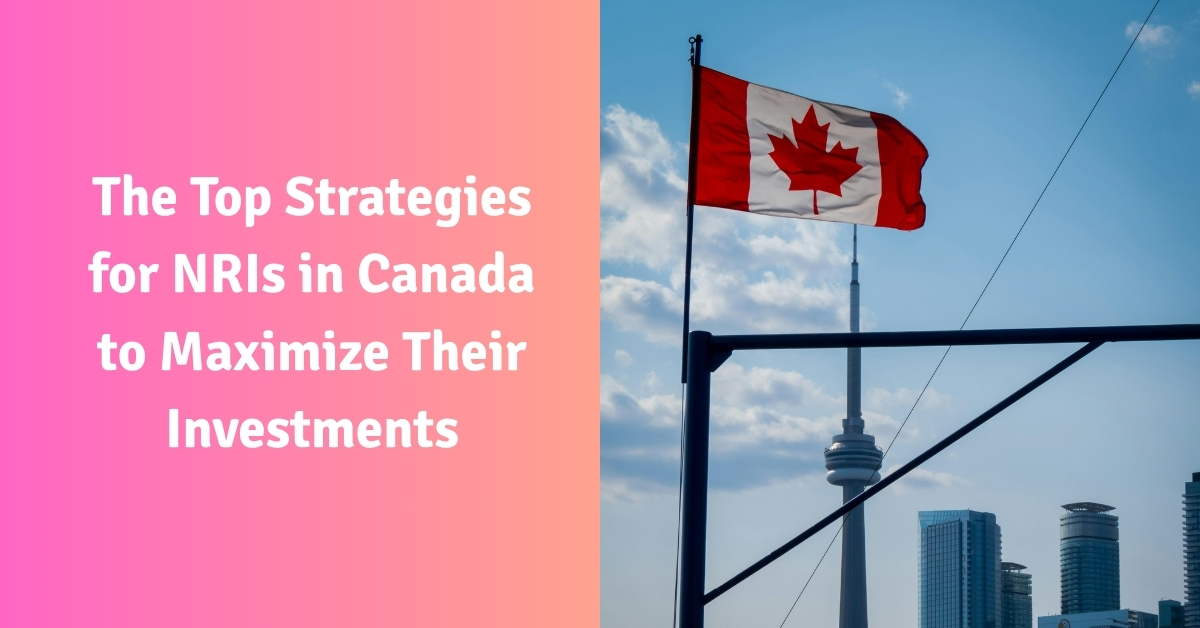Top Strategies for NRIs in Canada to Maximize Their Investments

For Non-Resident Indians residing in Canada, building robust investment portfolios extends beyond generating higher returns it requires informed decisions aligned with life goals, tax regulations, and financial obligations across both countries. Canada’s financial system presents opportunities alongside specific rules and limitations for foreign investors. Combined with emotional and financial connections most NRIs maintain with India, this creates a complex financial landscape demanding balanced, strategic approaches.
Whether funding children’s education, building long-term wealth, or planning peaceful retirement in India or Canada, this comprehensive guide explores top strategies for maximizing your investments.
Understanding Canadian and Indian Tax Systems
One primary challenge NRIs face involves understanding investment taxation across both jurisdictions. While India might offer attractive real estate or fixed deposit returns, the Canadian Revenue Agency (CRA) requires global income reporting, potentially subjecting earnings to local taxation.
Double Taxation Avoidance Agreements (DTAA) play crucial roles here. India-Canada DTAA allows NRIs to avoid double taxation on identical income. For instance, taxes paid on Indian mutual fund gains can be credited in Canada. However, claiming these benefits requires proper documentation and planning, preferably with financial advisors understanding both tax systems.
Diversifying Beyond Traditional Assets
Traditionally, many NRIs heavily rely on real estate and gold investments. While relatively safe, these assets don’t always provide necessary liquidity, growth, or diversification required in today’s globalized markets.
In Canada, NRIs can explore RRSPs (Registered Retirement Savings Plans) and TFSAs (Tax-Free Savings Accounts), offering tax benefits and long-term growth potential. These represent perfect retirement planning and wealth-building tools without immediate tax consequences.
For India-based investments, NRIs can utilize NRE (Non-Resident External) or NRO (Non-Resident Ordinary) accounts for mutual funds, fixed deposits, or stock market investments. Equity-linked savings schemes (ELSS) provide both tax-saving benefits and growth orientation.
Creating diversified mixes of Indian and Canadian investments spreads risks across markets and asset types, providing more stable long-term returns while reducing vulnerability to single-market downturns.
Currency Risk and Exchange Rate Management
Indian Rupee value against the Canadian Dollar significantly impacts investment returns, especially when remitting funds. Strategic timing of money transfers to India for investments or family support during favorable exchange rates can generate substantial savings.
Consider maintaining portions of investments in CAD or USD-denominated assets to balance currency risks. Global mutual funds or ETFs (Exchange Traded Funds) with international market exposure provide hedging while enabling global diversification.
Financial advisors understanding cross-border investing can help align currency exposure with long-term financial objectives, ensuring optimal risk management while maximizing growth potential.
Planning for Dual-Country Life
Many Canadian NRIs maintain strong connections to India emotionally, culturally, and financially. This often involves managing financial responsibilities across both countries, whether supporting aging parents, maintaining properties, or funding future Indian relocation.
Create comprehensive dual-country financial roadmaps. Allocate income portions toward short-term Canadian goals house purchases or children’s education while establishing Indian portfolios serving long-term objectives like retirement or healthcare needs.
Utilize regulated platforms and banks for remittances and cross-border investments. NRIs can also consider Indian infrastructure and renewable sector investments both government-backed and aligned with long-term national growth trajectories.
Professional Guidance: Essential for Success
Cross-border investing complexity makes professional guidance essential. What works for resident Indians or Canadian citizens may not suit NRIs. Many NRIs mistakenly over-rely on family back home for financial decisions or depend solely on local Canadian advisors lacking Indian context understanding.
Seek certified financial planners specializing in NRI portfolios. These advisors can help you:
- Comply with both Indian and Canadian tax regulations
- Avoid currency-related pitfalls
- Create globally functional retirement and estate plans
- Execute legal fund repatriation when needed
Appropriate guidance not only grows wealth but provides peace of mind that finances are properly managed across both countries, ensuring long-term financial security and compliance.
FAQs
1. Can Canadian NRIs invest in Indian mutual funds?
Ans- Yes, through NRE/NRO accounts via FATCA-compliant platforms supporting NRI onboarding.
2. Is investing in Canada or India better for NRIs?
Ans- Depends on individual goals. Diversification across both regions optimizes risk management and returns.
3. Must I pay taxes in both India and Canada?
Ans- Not necessarily. India-Canada DTAA helps avoid double taxation through proper planning.
4. Is Indian real estate investment still viable?
Ans- Yes, but consider liquidity constraints and maintenance challenges from abroad.
5. Can NRIs invest in Canadian RRSP or TFSA?
Ans- Yes, if you’re a Canadian tax resident. These accounts offer excellent long-term tax benefits.
6. Are there NRI-exclusive investment options in India?
Ans- Yes. NRIs can access NRE FDs, FCNR deposits, and specific NRI-catering mutual funds.
7. How should currency fluctuations be managed?
Ans- Diversify across CAD and INR assets, timing remittances during favorable exchange rates.
8. Should I have separate financial advisors for India and Canada?
Ans- Preferably choose advisors understanding both landscapes or collaborate with advisors in both countries.
9. What are the best Canada-to-India money transfer platforms?
Ans- Wise, Remitly, and ICICI Money2India represent popular, reliable options.
10. Must Indian income be declared in Canada?
Ans- Yes, Canadian residents must declare global income and pay applicable taxes.
Disclaimer: The information provided here is for educational and informational purposes only and should not be construed as financial, legal, or tax advice. Consult with a qualified professional before making any investment decisions. We do not accept any liability for errors or omissions in this information nor any direct, indirect, or consequential losses arising from its use.



